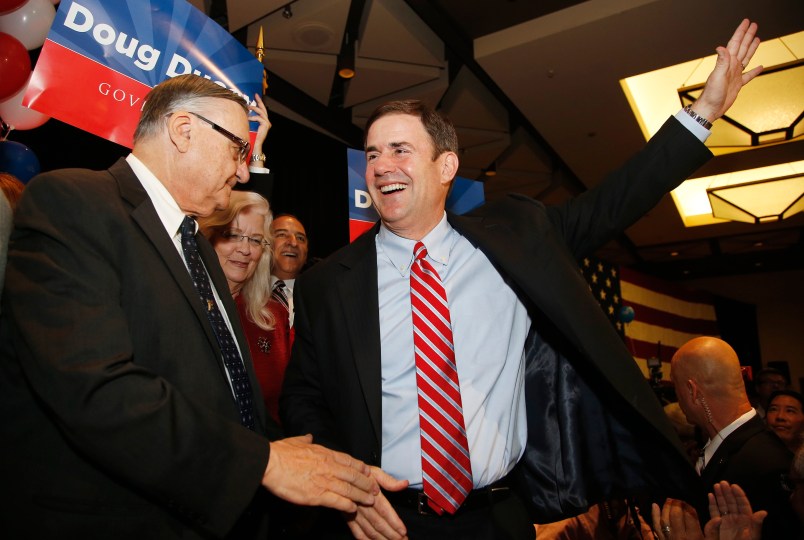Yesterday Arizona’s nasty and competitive Republican gubernatorial primary concluded with the right-wing favorite in the race, State Treasurer Doug Ducey, winning with a plurality of the vote over five rivals, including former Mesa mayor Steve Smith, who was endorsed by incumbent governor Jan Brewer. Ducey will have a serious challenge from Democrat Fred DuVal even in this reddish state.
The Arizona contest was a reminder that as many governorships as Senate seats are on the line in November — 36 of each, to be exact. But you haven’t heard remotely as much about gubernatorial contests, which could prove more important in the long run. Indeed, as the odds of a big Republican sweep of Senate seats decline, the odds increase that even if the GOP wins control this year they’ll lose it right back in 2016. All but two governors (New Hampshire and Vermont) chosen this year will stay in office through 2018, when it’s about time to think about redistricting again.
One factor in the relatively small national attention attracted by governor’s races this year has been a surprisingly low number of retirements despite a sour mood of anti-incumbency. Twenty-nine incumbents ran for re-election; four more were term-limited; only three (Linc Chafee of RI, Deval Patrick of MA, Rick Perry of TX) voluntarily retired. One (Hawaii’s Neil Abercrombie) has lost a primary. So there haven’t been as many competitive primaries or close general election races as might normally be the case.
According to the Cook Political Report, only 13 of the 36 races are competitive at present (as defined as tossups or contests “leaning” one way or another): six governorships currently held by Democrats and seven by Republicans. Eleven of these gubernatorial battlegrounds are in states carried by Obama in 2012 (Colorado, Connecticut, Florida, Hawaii, Illinois, Maine, Michigan, Ohio, Pennsylvania, Rhode Island and Wisconsin), and just two in states carried by Romney (Arkansas and Kansas). Some Democrats would add red Georgia and South Carolina to the competitive contest list; some Republicans think they have an outside chance in blue Massachusetts or Oregon. All in all, six Republican governorships are “mispositioned” in Obama ‘12 states, and one Democrat in a Romney ‘12 state.
Complicating everything, of course, are uncertain midterm turnout patterns, which tilted significantly Republican in 2010. In terms of national efforts to change these turnout patterns, it’s worth noting there’s not a great deal of overlap between the senatorial and gubernatorial battlegrounds. Only four of the ten states the Democratic Senate Campaign Committee’s Bannock Street Project is targeting with extraordinary resources for voter registration and contact programs have competitive gubernatorial races at the moment (Arkansas, Colorado, Georgia and Michigan). Only five states have both competitive governor’s races and nationally targeted battles for control of state legislative chambers (Arkansas, Colorado, Maine, Pennsylvania and Wisconsin).
The state of gubernatorial races helps provide an antidote to the “Republican wave” assumptions flowing from this year’s wildly slanted Senate landscape. At the moment the odds are low Republicans will make any net gubernatorial gains; they would have reason to be happy if wins in Arkansas and Illinois offset losses in Maine and Pennsylvania. They have a shot in Colorado and Connecticut and maybe even Hawaii, but then Florida, Wisconsin, and yes, Kansas are looking mighty shaky, with several other Republican incumbents not even close to being out of the woods. So don’t let Election Day dawn on you without a close look down the ballot from the obsessively followed Senate races. It matters.
Ed Kilgore is the principal blogger for Washington Monthly’s Political Animal blog, Managing Editor of The Democratic Strategist, and a Senior Fellow at the Progressive Policy Institute. Earlier he worked for three governors and a U.S. Senator. He can be followed on Twitter at @ed_kilgore.







Governors don’t worry me that much, if only because their legislatures are usually more dangerous than they are (Kansas being the notable exception). Still, if we’re GOTV to get GOPhers out of the House, I’m not going to cry if we can get/keep them out of the State House, as well.
“There Is Little Hope For A ‘Republican Wave’ In Guv Races”
You say that like its a bad thing.
I can only speak about PA. Corbett is toast! I want his ass out of office like yesterday!
Yes, their is balm in Gilead brothers and sisters!
Gimme an amen.
Doug Douche-y won the Republican primary in AZ last night. The idea of going from haggard faced Brewer to a man that looks like he’s clutching something between his ass cheeks all the time disturbs me.
Somebody hold me.